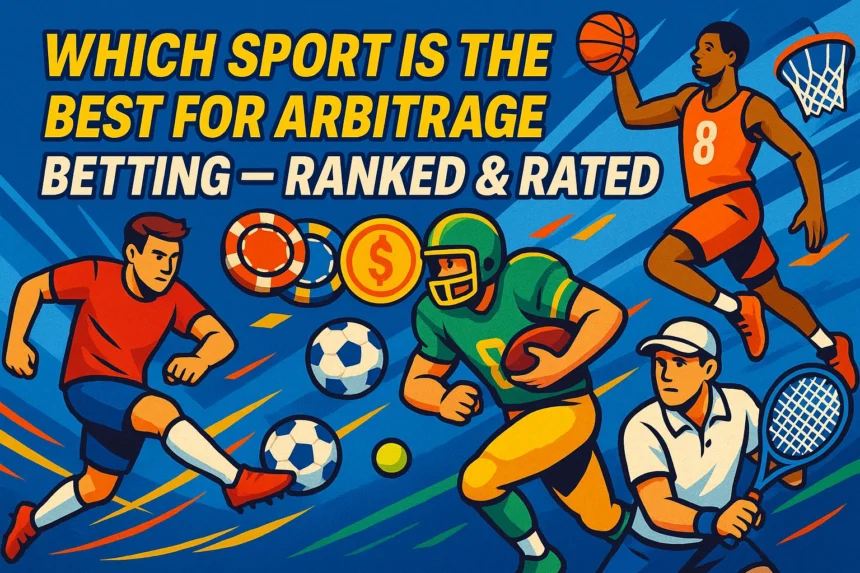It was a rainy Saturday afternoon when I first stumbled into the world of arbitrage betting. Frustrated by losing bets on my favorite football team, I was searching for a smarter way to play the odds. That’s when I discovered “arbing” — a strategy that promised guaranteed profits by betting on all outcomes of a game. My first successful arb was on a tennis match, netting me a modest $12 profit. It wasn’t much, but the thrill of a risk-free win hooked me. Since then, I’ve spent years exploring which sport is the best for arbitrage betting, and today, I’m sharing my findings, backed by research and personal experience, to help you find your winning edge.
Arbitrage betting, or “arbing,” involves placing bets on all possible outcomes of a sporting event across different bookmakers to lock in a profit, no matter the result. It’s like buying low and selling high in the stock market, but with sports odds. However, not all sports are created equal for arbing. Some offer frequent opportunities, while others are trickier. In this post, I’ll rank and rate the top sports for arbitrage betting, diving into why they work, their challenges, and how you can maximize profits.
What Makes a Sport Ideal for Arbitrage Betting?
Before we rank the sports, let’s break down the key factors that make a sport suitable for arbing:
- Number of Outcomes: Sports with fewer outcomes (e.g., tennis with two possible winners) are simpler to arb than those with multiple outcomes (e.g., soccer with win, lose, or draw).
- Market Liquidity: High betting volume means more bookmakers, bigger odds discrepancies, and larger bet sizes without raising red flags.
- Odds Volatility: Sports with fast-changing odds, like live basketball, create more arbitrage opportunities.
- Event Frequency: Sports with year-round events, like tennis, offer consistent arbing chances compared to seasonal sports like American football.
- Bookmaker Attention: Popular sports like soccer attract more scrutiny, increasing the risk of account limitations.
With these criteria in mind, let’s dive into the top sports for arbitrage betting, ranked from best to worst based on profitability, ease, and opportunity frequency.
Top 5 Sports for Arbitrage Betting — Ranked & Rated
1. Tennis — The Arbing Champion
Rating: 9/10
Why It’s Great: Tennis is the gold standard for arbitrage betting, and for good reason. With only two possible outcomes (Player A wins or Player B wins), it’s the simplest sport to arb. The global popularity of tennis ensures high betting liquidity, especially during major tournaments like Wimbledon or the US Open.
Live betting markets, where odds shift rapidly during matches, are a treasure trove for arbers. My first arb was on a Federer-Nadal match, where I found a 2.5% profit margin by betting on both players across two bookmakers.
Key Advantages:
- Two outcomes simplify calculations.
- Frequent tournaments (ATP, WTA, Grand Slams) provide year-round opportunities.
- Live betting odds fluctuate wildly, creating arbs.
- High liquidity allows larger bets without detection.
Challenges:
- Rapid odds changes in live markets require quick action or arbitrage software like OddsJam.
- Some bookmakers have inconsistent rules for handling retirements or disqualifications, which can void bets.
- Lesser-known tournaments may have lower liquidity, limiting bet sizes.
Pro Tip: Focus on live betting during tight matches between evenly matched players. Use tools like BetBurger to spot arbs in real-time. Avoid obscure tournaments where bookmakers might return bets due to player name errors.
3. Basketball — The Fast-Paced Opportunity
Rating: 8/10
Why It’s Great: Basketball’s fast-paced nature, especially in the NBA, makes it a hotspot for live arbitrage betting. Odds shift multiple times per minute during games, creating discrepancies across bookmakers. With only two outcomes (Team A or Team B wins), it’s nearly as simple as tennis.
I’ve had success arbing NBA playoff games, where high liquidity allowed me to place larger bets without detection.
Key Advantages:
- Two outcomes simplify arbing.
- Live betting markets are highly volatile, offering frequent arbs.
- High liquidity in NBA and EuroLeague markets supports bigger bets.
- Year-round events with global leagues.
Challenges:
- Rapid odds changes demand automation or lightning-fast reflexes.
- Bookmakers may limit accounts during high-profile games.
- Lower-tier leagues have less liquidity, capping profits.
Pro Tip: Use live betting software to catch arbs during momentum swings. Focus on spread betting markets, where odds discrepancies are common.
4. Horse Racing — The High-Risk, High-Reward Option
Rating: 7/10
Why It’s Great: Horse racing’s frequent odds fluctuations make it a unique arbing opportunity. By betting on a horse to win with one bookmaker and laying it on a betting exchange like Betfair, arbers can lock in profits. The sport’s high liquidity during major events like the Kentucky Derby or Grand National supports substantial bets. I tried arbing a race at Ascot, netting a 4% profit, but it required meticulous timing.
Key Advantages:
- Significant odds volatility creates arbs.
- Betting exchanges simplify laying bets.
- Major races have massive liquidity.
- Frequent races provide daily opportunities.
Challenges:
- Multiple outcomes (many horses) complicate calculations.
- Bookmakers heavily scrutinize horse racing bets.
- Odds can shift seconds before a race, voiding arbs.
Pro Tip: Stick to major races and use betting exchanges to lay bets. Avoid manual arbing due to the sport’s complexity — invest in software like RebelBetting.
5. Boxing — The Underdog Pick
Rating: 6.5/10
Why It’s Great: Boxing’s two-outcome structure (Fighter A or Fighter B wins, draws are rare) makes it appealing for arbing. Bookmakers often misprice underdogs, creating profitable discrepancies. I arbed a high-profile fight between two heavyweights, leveraging differing opinions on the underdog to secure a 2.8% profit. Major fights attract high liquidity, supporting larger bets.
Key Advantages:
- Two outcomes simplify arbing.
- Underdog mispricing creates frequent arbs.
- High-profile fights have strong liquidity.
Challenges:
- Infrequent events limit opportunities.
- Draws, though rare, can disrupt calculations.
- Bookmakers may void bets due to fight cancellations.
Pro Tip: Focus on high-profile bouts and monitor odds weeks in advance. Use multiple sportsbooks to capitalize on differing opinions about fighters.
Comparison Table: Top Sports for Arbitrage Betting
| Sport | Outcomes | Liquidity | Odds Volatility | Event Frequency | Bookmaker Scrutiny | Rating |
|---|---|---|---|---|---|---|
| Tennis | 2 | High | High | Year-round | Moderate | 9/10 |
| Football | 3 | Very High | Moderate | Year-round | High | 8.5/10 |
| Basketball | 2 | High | Very High | Year-round | Moderate | 8/10 |
| Horse Racing | Many | High | High | Daily | Very High | 7/10 |
| Boxing | 2 | Moderate | Moderate | Infrequent | Moderate | 6.5/10 |
Key Insights for Successful Arbitrage Betting
- Invest in Tools: Manual arbing is time-consuming and error-prone. Software like OddsShopper or ProfitDuel scans hundreds of bookmakers in real-time, saving you hours and boosting profits.
- Diversify Sportsbooks: Sign up with multiple reputable bookmakers like DraftKings and Pinnacle, which is known for low margins and arb-friendly policies. More accounts mean more opportunities.
- Start Small: Begin with low stakes to master calculations and avoid detection. My early arbs were $50 bets, which helped me learn without risking account bans.
- Stay Under the Radar: Bookmakers dislike arbers and may limit or ban accounts. Mimic recreational bettors by varying bet sizes, avoiding round numbers, and mixing arbs with regular bets.
- Leverage Live Betting: Live markets in tennis and basketball are arbing goldmines due to rapid odds shifts. Use automation to act before opportunities vanish.
Challenges and Risks of Arbitrage Betting
While arbing offers guaranteed profits, it’s not without hurdles:
- Account Limitations: Bookmakers track unusual betting patterns, like frequent withdrawals or exploiting high odds. I once had an account limited after a string of football arbs.
- Time and Capital: Arbing requires significant time to monitor odds and a substantial bankroll to make meaningful profits, as margins are often 1-5%.
- Odds Volatility: Opportunities disappear quickly, especially in horse racing or live basketball.
- Legal Considerations: While arbing is legal where sports betting is permitted, ensure you use licensed bookmakers to avoid issues.
Conclusion: Which Sport Should You Choose?
After years of arbing and analyzing data, I crown tennis as the best sport for arbitrage betting. Its two-outcome simplicity, year-round events, and volatile live markets make it a no-brainer for beginners and pros alike. Football and basketball follow closely, offering high liquidity and diverse markets, while horse racing and boxing are niche but profitable with the right approach.
To succeed, invest in arbitrage software, diversify your sportsbooks, and stay discreet to avoid bookmaker scrutiny. Whether you’re chasing small, consistent wins or aiming for bigger profits, arbing can transform your betting game — just like it did for me on that rainy Saturday.
What’s your favorite sport to arb, or are you ready to try one of these? Share your thoughts in the comments, or explore our guide to arbitrage betting tools to get started.


















